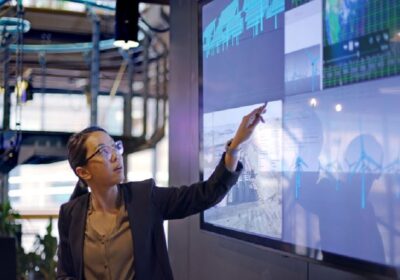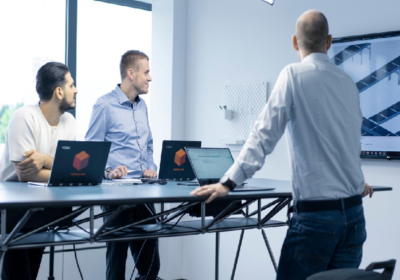Exploring the Surprising Benefits of Using Long-Range RFID Readers, GPS Tracking, and Vehicle Monitoring Systems Together
Witnessing something astonishing in today’s ultra-rapid environment, where everything occurs swiftly. It’s when long-range RFID (Radio-Frequency Identification) readers, GPS tracking company, and vehicle monitoring systems come together. They collaborate to simplify things in several disciplines, acting as a superhero team. Will here to share some exciting developments resulting from these innovative friends’ collaboration.
Super Fleet Management:
Together, these heroes make it incredibly simple to control a large fleet of vehicles. Can track each vehicle’s whereabouts in real-time using GPS. Bosses can better plan their schedules, monitor the routes, and ensure deliveries are made on time. And what’s this? RFID readers also help us track the cars’ contents so that always know where everything is.
Safeguarding Valuables:
Protecting valuable items is crucial, especially when moving things about, such as during shipment and transit. Have more security thanks to GPS, vehicle tracking, and RFID readers working together.
Super Route Planning:
GPS tracking is similar to having a map that displays the location. It aids in better route planning, fuel economy, and vehicle maintenance. When to include a long distance rfid reader, they ensure that to load the appropriate cargo into the suitable cars. That eliminates the need to speculate or waste time repeatedly examining things.
Financial management:
Money is saved when GPS, vehicle monitoring, and RFID are combined. Don’t lose anything, use less fuel, and don’t have to spend a lot of money on inventory checking. More money will be in the pockets as a result.
Respecting the Law: Some businesses are required to respect certain laws. For example, they need to keep specific things at the right temperature or follow safety protocols when handling dangerous materials.
Cost reductions: Although the upfront cost of RFID technology may appear high, there may be significant long-term cost reductions. A healthier bottom line for organizations results from decreased theft, improved maintenance, higher fuel efficiency, and more asset utilization.
While there are many advantages to incorporating long-distance RFID readers into GPS monitoring systems, there are also some difficulties and things are,
Complexity of the Integration: Combining two different technologies can be difficult. The software and hardware used by GPS tracking firms must be compatible with long-distance RFID readers. Testing and special development could be necessary for this.
Data Security: Data security is crucial given the rising interconnection of systems. It is essential to prevent unauthorized access to critical information, such as vehicle whereabouts and inventory records.
Scalability: As a company expands, more is expected of its vehicle monitoring system. GPS tracking firms should create scalable solutions for growing fleets and changing requirements.
Training and Adoption: Staff members must be adequately instructed on using the integrated system. To fully reap the rewards of technology, it is crucial to ensure that staff can utilize it.
Upkeep and Upkeep: RFID and GPS tracking devices require upkeep to perform at their best. To avoid system failures, regular checks and updates are needed.
Earth-friendly business practices:
GPS tracking combined with vehicle tracking and RFID readers is like giving Mother Nature a secret weapon. By planning routes that are incredibly efficient, here not only save money but also lessen the environmental impact. Making the earth healthier by reducing global warming gasses and pollutants is like magic.
Super Safety Moves:
Safety becomes the superhero when to mix GPS tracking, vehicle monitoring, and RFID magic. These technological heroes let us know how fast all are moving, how they maneuver, and when the cars could use some maintenance. Additionally, RFID ensures that it addresses hazardous situations with professionalism, making the world safer for everyone—including drivers.
Maintenance Magic:
Maintaining automobiles in peak condition is crucial. The health of the vehicles, including how well their engines are running and whether they require some maintenance, can be discovered through GPS tracking and vehicle monitoring. Can even use RFID to track the components to use. Can plan check-ups using this information to prevent unpleasant surprises on the road.
Inventory intelligence:
Keeping track of things can be problematic in some industries, like hospitals and retail. Can precisely fix it now that GPS and vehicle monitoring are combined with RFID pals. The supply chain is a logistical wonder because to prevent mistakes, never run out of supplies, and maintain order.
Simple Growth:
Businesses’ requirements become more complex as they grow. GPS tracking, vehicle monitoring, and RFID work together like a superhero team that can change form. They may adapt to meet any new requirements, whether introducing more cars or services or reaching out to other regions.
Beating Your Competition:
Businesses that use cutting-edge technology like GPS, vehicle tracking, and RFID have an advantage. They can offer excellent services that stand out from the competition. This elevates them to the status of heroes in cutthroat fields, winning them additional admirers and allies.
Data Security and Privacy Defenders:
With enormous technological capability comes the duty to secure data. This is a severe matter for the GPS, vehicle monitoring, and RFID teams. Sensitive information, including client secrets and crucial numbers, is protected by sophisticated measures. It follows all the rules and stays in the right hands.
Incorporating GPS tracking, vehicle monitoring, and long-distance RFID readers into daily corporate operations adds mystery and complication. These technological superheroes help save the planet, improve safety, make maintenance seem magical, solve inventory mysteries, adjust to change, outperform rivals, and guarantee data security. By embracing this tech trifecta, businesses may face the problems of the modern world with flair and grace.
Finally, incorporating long-distance RFID readers into GPS tracking systems gives GPS tracking businesses a potent tool to enhance vehicle monitoring. Despite the difficulties, the security, effectiveness, and cost savings advantages make this integration a worthwhile investment.
Conclusion:
Long-distance RFID readers’ incorporation into GPS tracking systems substantially improves the ability to monitor moving objects. GPS-tracking businesses can significantly reduce costs while enhancing security, streamlining operations, and improving customer service by integrating the benefits of both systems. The combination of GPS tracking and long-distance RFID technology is poised to play a significant role in influencing the future of vehicle monitoring as companies continue to look for more effective and efficient ways to manage their fleets.


















